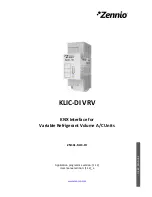
ENGINEERING MANUAL OF AUTOMATIC CONTROL
CHILLER, BOILER, AND DISTRIBUTION SYSTEM CONTROL APPLICATIONS
369
The disc trap (Fig. 106) is a device with only one moving part.
As steam in the chamber above the disc cools and condenses, the
disc snaps open releasing condensate. These traps cycle
independent of condensate load. Systems using these traps usually
have a means of recovering heat from the condensate. They are
used primarily on high pressure steam systems.
Reprinted by permission from the ASHRAE Handbook—
1996 Systems and Equipment
Fig. 108. Piston Trap.
PRESSURE REDUCING VALVE STATION
Pressure reducing valve (PRV) stations are used in steam
systems where high pressure steam, usually at 500 kPa to
900 kPa, is distributed for low pressure requirements (Fig. 109).
CHAMBER
ANNULAR
PASSAGE
DISCHARGE
PORT
OUTLET
INLET
DISC
(VALVE)
INLET
ORIFACE
M15073
Reprinted by permission from the ASHRAE Handbook—
1996 Systems and Equipment
Fig. 106. Disc Trap.
The orifice trap (Fig. 107) has no moving parts. It relies on
only a little steam flowing through the orifice because of the
low density of steam compared to condensate. It must have
constant supply pressure, constant demand, and constant
ambient temperature to operate.
INLET
SCREEN
ORIFICE
FLOW
M15074
Reprinted by permission from the ASHRAE Handbook—
1996 Systems and Equipment
Fig. 107. Orifice Trap.
The piston trap (Fig. 108) relies on a pressure change caused
by steam or condensate entering the trap to open or close the
piston or port. A small amount of condensate bleeds through
an orifice in the control disc into the control chamber. When
steam or condensate that flashes to steam enters the chamber,
the port is closed until the pressure in the control chamber falls.
The port then opens allowing condensate to pass.
VALVE
OUTLET
INLET
PORT
CONTROL
CHAMBER
CONTROL
DISC
M15075
Fig. 109. PRV Station.
If steam is supplied at less than 500 kPa, a single stage PRV
(Fig. 109) is required. For 500 kPa or higher main pressure, a
second stage is added, in part because critical pressure drop
(50 percent of the absolute inlet pressure) through a single stage
PRV will cause noise and wear problems.
Since steam at 900 kPa has a temperature of more than 175
°
C
and little heat energy is dissipated through a PRV, the 150 kPa
steam leaving the PRV station will be superheated (temperature
is more than 108
°
C) for some distance downstream from the
station.
Selection of valve materials used to regulate the 150 kPa
steam must take this superheat into account, particularly for a
device in close proximity to the PRV.
HIGH
PRESSURE
MAIN
PRESSURE
REDUCING VALVE
BYPASS
SAFETY
RELIEF
VALVE
LOW
PRESSURE
MAIN
BALANCE LINE
MANUAL
VALVE
PILOT
VALVE
M15076
Summary of Contents for AUTOMATIC CONTROL SI Edition
Page 1: ...AUTOMATIC CONTROL for ENGINEERING MANUAL of COMMERCIAL BUILDINGS SI Edition ...
Page 4: ...ENGINEERING MANUAL OF AUTOMATIC CONTROL iv ...
Page 6: ...ENGINEERING MANUAL OF AUTOMATIC CONTROL vi ...
Page 46: ...ENGINEERING MANUAL OF AUTOMATIC CONTROL CONTROL FUNDAMENTALS 36 ...
Page 66: ...ENGINEERING MANUAL OF AUTOMATIC CONTROL PSYCHROMETRIC CHART FUNDAMENTALS 56 ...
Page 128: ...ENGINEERING MANUAL OF AUTOMATIC CONTROL ELECTRIC CONTROL FUNDAMENTALS 118 ...
Page 158: ...MICROPROCESSOR BASED DDC FUNDAMENTALS 148 ENGINEERING MANUAL OF AUTOMATIC CONTROL ...
Page 208: ...ENGINEERING MANUAL OF AUTOMATIC CONTROL BUILDING MANAGEMENT SYSTEM FUNDAMENTALS 198 ...
Page 493: ...INDEX ENGINEERING MANUAL OF AUTOMATIC CONTROL 483 INDEX ...
Page 506: ...ENGINEERING MANUAL OF AUTOMATIC CONTROL INDEX 496 NOTES ...
Page 507: ...INDEX ENGINEERING MANUAL OF AUTOMATIC CONTROL 497 NOTES ...
Page 508: ...ENGINEERING MANUAL OF AUTOMATIC CONTROL INDEX 498 NOTES ...
Page 509: ...INDEX ENGINEERING MANUAL OF AUTOMATIC CONTROL 499 NOTES ...
Page 510: ...ENGINEERING MANUAL OF AUTOMATIC CONTROL INDEX 500 NOTES ...
Page 511: ...INDEX ENGINEERING MANUAL OF AUTOMATIC CONTROL 501 NOTES ...
Page 512: ...ENGINEERING MANUAL OF AUTOMATIC CONTROL INDEX 502 NOTES ...
















































